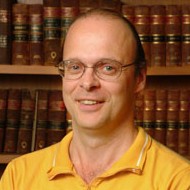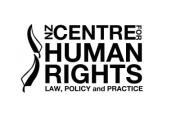Changing the world: Kris Gledhill
 In 2006 Kris Gledhill arrived in NZ from England to complete a PhD. He already had a comprehensive list of achievements behind him: an established appellate criminal and public law practice, appearances in precedent setting cases in the European Court of Human Rights, the House of Lords and the Court of Appeal, and varying teaching positions at SOAS, UCL, University College Oxford and the London School of Law.
In 2006 Kris Gledhill arrived in NZ from England to complete a PhD. He already had a comprehensive list of achievements behind him: an established appellate criminal and public law practice, appearances in precedent setting cases in the European Court of Human Rights, the House of Lords and the Court of Appeal, and varying teaching positions at SOAS, UCL, University College Oxford and the London School of Law.
By the beginning of 2007 he’d accepted a lectureship at Auckland University Law School. And in 2012 he became the inaugural Director of the New Zealand Centre for Human Rights Law, Policy and Practice.
It’s a big name for a new initiative. However the intentions and impetus behind the centre amply match it.
From the outset the plan is to provide a nucleus or focal point for those involved in human rights activities; creating or affecting social change through understanding, interpreting and challenging current policy and practice. The arenas may vary; research, education or community service but the core is shared; a united vision of lives made better through respectful collaboration across New Zealand and the wider Asia Pacific region.
creating or affecting social change through understanding, interpreting and challenging current policy and practice. The arenas may vary; research, education or community service but the core is shared; a united vision of lives made better through respectful collaboration across New Zealand and the wider Asia Pacific region.
Members of the centre are drawn from various universities in NZ, (both in law faculties and other disciplines) who are involved in human rights issues and other activities.
Background
Kris is no stranger to the ideals the centre stands for. He grew up with them. The child of active Trade Unionists, he says his desire for justice for all was the natural extension of witnessing the work his parents did. His mother was a committed conference-attending shop steward for the Nurses Union while his father, a plumber, took an active role at the factory where he worked.
He remembers his growing awareness that the key to powerful and long lasting change was education and then specifically, law school. To be a lawyer, he thought, was to have the ability to influence – to become the conduit for significant social change. That perception, reinforced by a British TV drama, Justice, screened in his pre-teen years starring a female barrister in the North of England, was endorsed by his parents.
Why NZ?
Kris says that NZ is a natural choice of country to host the centre as historically the ‘firsts’ in Human Rights are significant. NZ was the first country to give women the vote, implement comprehensive social security, and the Bill of Rights is a model that has been adopted elsewhere. The result is an international reputation as a socially aware and responsible country. The combination of its location and history makes it a convenient neutral meeting place for many Asia/Pacific countries who have dissimilar legacies.
The goals of New Zealand Centre for Human Rights Law, Policy and Practice (NZCHRLPP) are long term.
They wish to become an integral partner in the overall development and strategic planning within the Asia/ Pacific region. That desire extends to encompass all facets of human activity: inter-country and cross-cultural relationships, corporate responsibility as well as sustainability and environmental issues.
That will be achieved through a combination of extensive net-working, multi-cultural and cross-disciplinary research, debates, forums, education, and course development.
Human Rights Law as a Career
Contrary to the common public perception the leading impulse behind choosing a career in law is not always status, money, and the power those bring. It can be the genuine desire to bring a little equality into an unequal world, to be an agent of change in any one of multiple arenas, for example; business, national and international NGOs, government or civil rights.
For those who aspire to serve, one of the goals of the centre is to make the HR pathway clearer.
The centre will actively build inter-organisational networks and relationships which they’ll encourage students to explore.
The Role of Youth
The cliché, the young people of today make the world of tomorrow, is irrefutable. Much of the awareness raising the centre has undertaken to date focuses on them eg. Young Lawyers Human Rights Lawyers Association Information Evening
However to enable them to practically carry the vision of an equable world into reality they need the grounding that only comes with experience and training. It’s Kris’ intention to initiate a mentoring arrangement whereby retired lawyers freely share their wisdom and expertise; mutually beneficial inter-generational partnerships with a common focus, equal and fair justice. In time he would like to see that all NGOs have the capacity to submit shadow reports at a national and international level across all spheres of activity. To achieve that, the young need their elder’s guidance.
Support for NZCHRLPP
The Centre was established as of 1 January 2012 by the Dean of the Faculty of Law at the University of Auckland with initial funding from the Faculty of Law and the University of Auckland.
Like any other newly established initiative it has its accountabilities. In two years it needs to justify its continued existence through tangible demonstrations of influence and impact. That translates into research undertaken, books written, courses taught, student enrolments, and symposium appearances; active engagement with the practicing profession is also a key performance indicator. At present Kris is working on an idea to provide practical doable steps showing ‘how to lobby’ or to put human rights law into action.
To find out more click:
Related sites of interest:
Publications with Thomson Reuters as General Editor with Margaret Bedggood:
Law into Action: Economic, Social and Cultural Rights in Aotearoa New Zealand